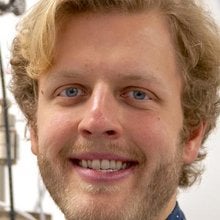Infrared optoelectronics devices often require cooling because they contain thick layers of narrow band gap materials. However, uncooled infrared devices are becoming increasingly important for critical applications in quantum information science (QIS), medical diagnosis, and pollution monitoring. My research addresses this challenge through an integrated design approach for optoelectronic devices, which combines novel nanophotonic modes, quantum-engineered active regions, epitaxial crystal growth, and advanced semiconductor fabrication techniques to achieve superior device performance. I will showcase several structures and devices that employ this approach, including the ultra-thin plasmonic photodetector. This ultra-thin device integrates a “designer” epitaxial plasmonic metal and a quantum-engineered detector architecture, all within a III-V semiconductor material system. The ultra-thin plasmonic detectors boast a sub-diffractive absorber (311 nm, ∼𝜆/33), resulting in efficient absorption (~40 %), low-noise, and improved performance compared to the state-of-the-art. Most importantly, these ultra-thin detectors can operate at high temperatures that can be easily achieved with a thermoelectric cooler (195 K to 230 K). In contrast, the current technology requires much more stringent cooling requirements (~ 77 K). I will also discuss extending this design approach to other material systems, wavelengths, and applications, such as improving single-photon detectors for QIS.

Leland Nordin is a postdoctoral research fellow at Stanford University, working with Professor Kunal Mukherjee's and affiliated with the Geballe Laboratory for Advanced Materials. Leland holds a B.A. in Physics (Honors) from Grinnell College and an MSE and PhD in Electrical and Computer Engineering from The University of Texas at Austin.


